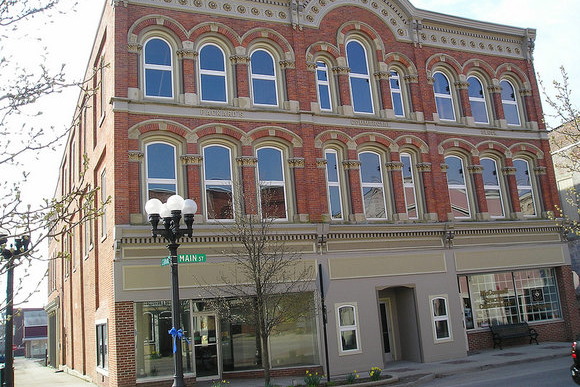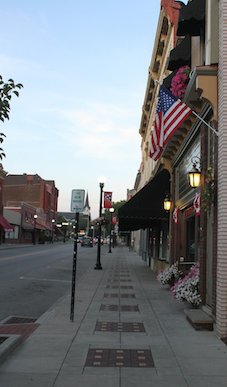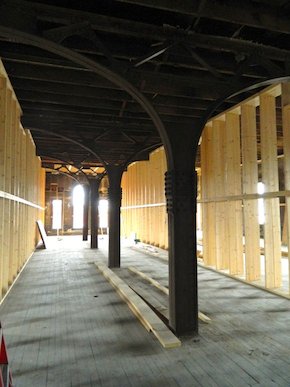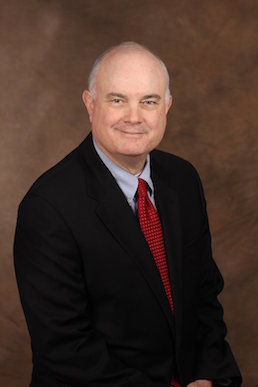Tiny Greenville Borough, Pennsylvania — population 5,900, 75 miles north of Pittsburgh — is about to become a world center for deep brain stimulation. This innovative therapy could help patients with Parkinson's disease, obsessive-compulsive disorder and other chronic illnesses.
The Greenville Neuromodulation Center (GNC) is currently renovating the Packard Building, a three-story historic structure, for on-site and remote medical procedures as well as a 13-room inn for patients, families and visiting health-care professionals. So, how did this small-town Main Street attract such a cutting-edge facility?
The key is the influence of one man, Fred Haer, on Greenville and the town's Thiel College. Haer and his wife graduated in the mid-1960s, and he served on the board of trustees from 1998 to 2007. Haer is founder, board chairman and treasurer of FHC in Maine; they manufacture medical instruments for cranial micro-targeting. This deep brain stimulation (DBS) involves placing tiny electrodes in the brain to stimulate nerve cells, or neurons, relieving specific disease symptoms. In 2009, along with UPMC Horizon (also on Greenville's Main Street), Haer helped create Thiel's neuroscience major.
Just three years before that, Haer bought the Packard building, and now GNC is renovating its three storefronts and has moved into the first floor. It will be the nonprofit arm of Greenville Neuromodulation Services (GNS), which has been offering DBS tools and training for several years right across the street, with Haer as president and CEO. GNC's medical director, Dr. Erwin Montgomery Jr., has been appointed the Greenville Neuromodulation Scholar of Neuromodulation and Philosophy at Thiel and is team-teaching a course this spring with philosophy profressor Arthur White on the ethics of everyday medicine. Thiel neuroscience students will be able to intern at GNC in the future.
Opportunity knocks
“Good thing we caught it when we did,” says GNS Vice President Tim Williams, referring to the Packard Building. “There was a lot of water coming in through the ceiling.”
The team has already put half a million dollars into façade renovation, as well as made repairs to the roof and replaced the windows. A tour of the 21,000-square-foot structure shows restored original tin ceilings, new drywall and updated insulation.
On the floors above, however, generations of wallpaper are still peeling from brick walls and structural elements are exposed. With grants, GNC hopes to create a new entrance in the middle storefront and a new staircase stretching to the third floor, where the inn will allow patients to convalesce while being diagnosed or having surgery; it will also make life easy for visiting health-care professionals.
Plans also include a renovated basement, a learning annex for Thiel students, with a library and study carrels; conference and exam rooms; hardware development laboratories; physical therapy offices; a human neurophysiology lab; microelectrode research lab; electrophysiology recording lab; and a fitness center.
“What drives us is that we want the patient to come out of the clinic here really understanding their illness,” says Montgomery. “We want them to understand why this particular treatment was offered.”
In deep brain stimulation (DBS), tiny electrodes are inserted into the brain through holes in the skull, then connected via a wire to a regulator, analogous to a heart pacemaker, in the patient's chest. From there, the level and frequency of stimulation, as well as the target among the electrodes, can be varied according to the patient's changing needs.
As Montgomery explains, DBS must first pinpoint the correct neurons to stimulate: “We eavesdrop on the conversations the neurons are having. Getting the electrodes in the exact right spot [to half a millimeter accuracy] is technically very complex.”
Fortunately GNC has the technology to find the right location, including an apparatus specially designed to fit around each individual patient's head; this helps surgeons use medical scans to measure the electrode placement.
Hopefully those surgeons will eventually travel to Greenville to train using GNC's techniques and equipment. “Fred Haer talked to us years ago about coming here, with a vision to make Greenville like the Mayo Clinic, where people would come from all over the world to have surgery here,” says Montgomery.
Since then, the health-care market and the economy have changed, leaving people with less money to come to Greenville. No problem — now Greenville is coming to the people. GNC will use their own newly designed distance-learning software to teach and guide surgeons in real time across the globe via the Internet.
“With this technology, any surgeon in the world, if they can put a screw in a skull and get an MRI or CT scan, can do this surgery,” says Williams.
There are about 200 medical clinics performing DBS across the country today, including sites in Pittsburgh, Philadelphia, Harrisburg, State College and Danville.
“We know that 10 to 15 percent of patients with Parkinson's disease would be eligible for the surgery,” says Williams. “The problem is, only 10 percent are being referred” for the treatment, and most sites are in large cities with major university-affiliated medical institutions. “There are huge swaths of the country where people just don't have access to this surgery.”
So from Utah to Uganda, GNC can help give new patients that access. DBS may also be applicable to other medical conditions, such as Tourette's, depression and epilepsy.
“There are clinical trials underway for stroke, Alzheimer's disease,” notes Montgomery. “What's hampering us is not the technology but the logistics: trying to get that technology out to the people who need it.” Through GNC's Internet training and coaching, “we can open up these bottlenecks.”
Choosing Main Street
“This center could have been anywhere in the world, and for Fred Haer to pick Greenville is pretty cool,” says Fred Kiser, Greenville Area Chamber of Commerce's community liaison. Kiser is a retired high-school guidance counselor who has lived here all his life. “We're like a lot of small towns. We've lost some industry and large companies.”
But Greenville has managed to attract 20 new businesses to Main Street over the past three years, and Kiser is very pleased that GNC is underway. “When there are [DBS] procedures here, or at the Greenville branch of UPMC, the friends and family of patients will be coming to the Greenville area,” he says. “Once somebody is familiar with a place, and they go, 'Hey, this is a pretty nice place!' who knows? There is a special effect and it might help us economically.”
GNC employs a science writer and recently hired a computer scientist to help create simulations to test their therapy models. As they continue to expand, they'll employ more health-care professionals and physicians.
Troy D. VanAken, president of Thiel College, calls the advent of GNC “a real plus for the community. It's a great opportunity for [students] to get some real-world experience and develop their careers.”
Montgomery, he adds, “has been very instrumental in helping us put together a world-class speaker series” on brain research this spring, which is free and open to public. And with GNC, Thiel is now recruiting a new faculty member in neuroscience. VanAken hopes the college and GNC will collaborate on research projects, perhaps using Thiel's new animal facility.
“This is providing jobs in town for professional people, not just our alumni,” he adds. “It's making Greenville more successful.”
“When I moved to Greenville in July, I was so impressed,” says Montgomery. “Free concerts in the park. Parades. That kind of community support and genuine interest in your neighbor … that's the kind of thing we want to bring to patient care.”
“[Fred Haer] wanted to do something for downtown,” adds Williams, who has lived in Greenville since the age of nine. “What he has done has started a center of medical device companies. If we get this done, all of a sudden other companies might follow. I've lived through the good times and I've lived through the bad times, so to get these people working together to make this dream happen is exciting.”
CORRECTION: This story has been corrected; Greenville is not in the Allegheny mountains.




